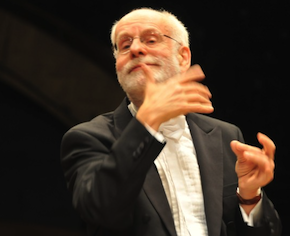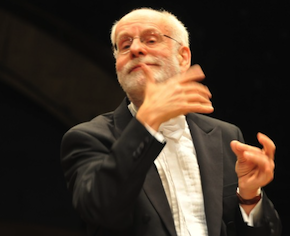
The San Francisco Symphony is currently on two weeks of ‘Bach camp.’ The orchestra has been delving into the music of father J.S. and son C.P.E Bach under the guidance of Dutch conductor, organist, harpsichordist, and internationally renowned Bach scholar Ton Koopman. Friday evening’s concert was the clearest illustration (that I can remember) of the remarkable influence a guest conductor like Koopman can have on an orchestra.
Influence like that can only go so far. It is not very likely that, even under Koopman, the SFS would ever be mistaken for a genuine period ensemble. Yet, the solemn first measures of the brilliant overture of J.S. Bach’s Orchestral Suite No. 4 BWV 1069 that opened the concert, demonstrated immediately that Koopman touches everything: phrasing, tempo, timbre, intonation, ornamentation, ensemble playing — and the orchestra responded to his instruction like the living and breathing organism that it is.
In a recent radio interview for KALW’s Open Air, Koopman (pronounced “COPE-mahn”) sang the Symphony’s praises and mentioned how the musicians meet him with curiosity and complete openness to his approach, which is sometimes far removed from what musicians in a ‘modern’ symphony orchestra are accustomed to. “They are creative and capable; they are very good musicians, and they like to [play Bach] differently. I like to be the medium to help do that, and in the end of course, enjoy a nice concert.”
And it was more than just a ‘nice’ concert. With his distinct style of conducting, shaped by decades of leading ensembles from the harpsichord, Koopman created a new comfort zone for the San Francisco musicians — one where baroque magic happened.
With his distinct style of conducting, shaped by decades of leading ensembles from the harpsichord, Koopman created a new comfort zone for the San Francisco musicians — one where baroque magic happened.
The high point of Bach’s Orchestral suite lay in the stunning Minuet and the thrilling ride of the final Réjouissance. Likewise, the two compositions by Carl Philipp Emanuel Bach (according to SFS program annotator James M. Keller ‘the most underrated composer in music history’) offered wonderful musical moments of their own.
Case in point: the second movement of his third cello concerto, which contains one of the saddest and most plaintive melodies ever written. SFS Associate Principal Cello Peter Wyrick explored every aspect of this sorrowful theme, underscored it with a mournful cadenza of his own creation and brought the concerto to a cheerful, virtuosic end with the energetic Allegro assai finale.
C.P.E’s Symphony in G Major from 1776 was a clear indication that this Bach is not only a generation younger than his illustrious father, but that his work foreshadows Mozart and even hints at early Beethoven. It is unfortunate that even in his 300th anniversary year, C.P.E. Bach (1714-1788) doesn’t quite get as much exposure as he deserves, but the cello concerto and the symphony at least made a strong case for increased future programming of his work.
Koopman and the SFS concluded the concert with J.S. Bach’s Cantata No. 51, Jauchzet Gott in allen Landen, BWV 51, with impressive solo work by soprano Carolyn Sampson and SFS Principal Trumpet Mark Inouye, culminating in a glowing torrent of glorious coloraturas in the closing Alleluja.

